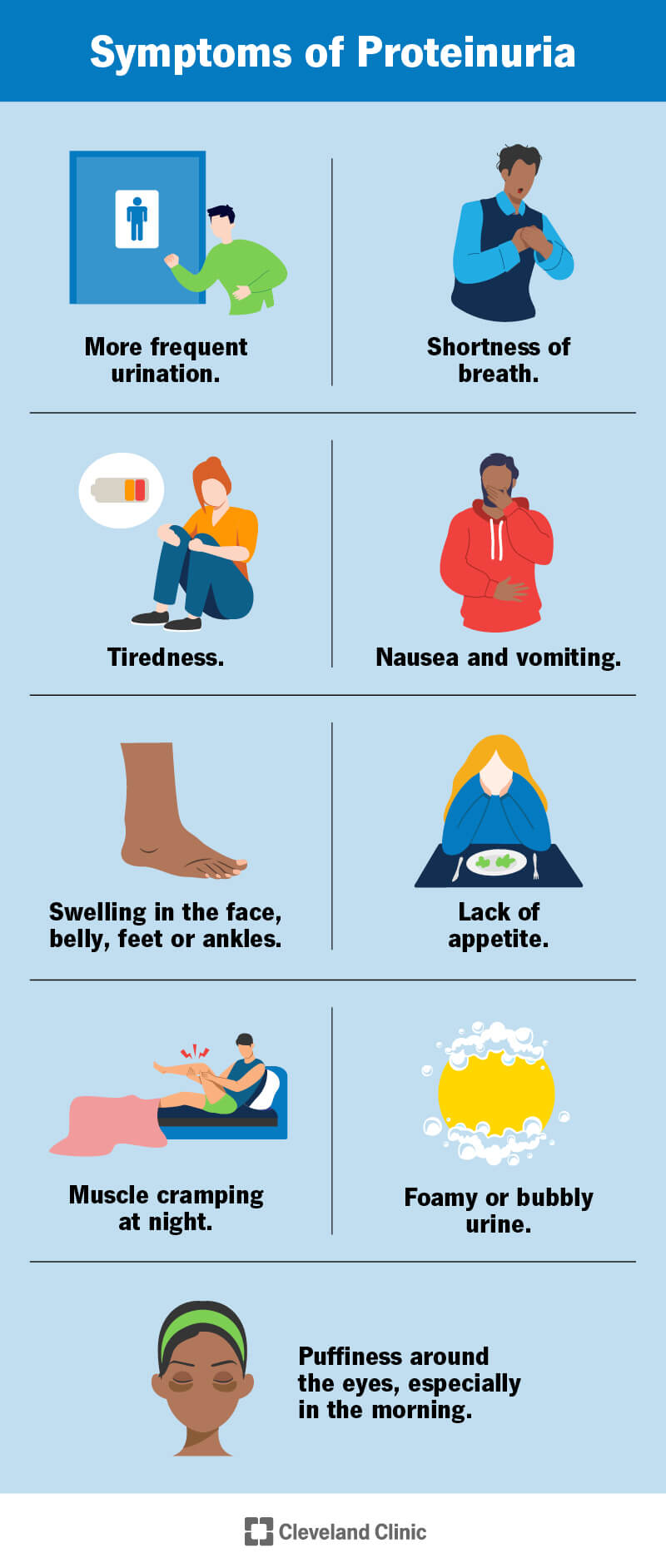Protein in your urine (proteinuria) can be a sign that protein is getting past your kidneys’ filtration system and leaving your body in your pee. It can make your pee look foamy or bubbly. Kidney disease, diabetes, autoimmune disorders, preeclampsia and other serious conditions can cause it. Other causes include dehydration and fever.
Advertisement
Cleveland Clinic is a non-profit academic medical center. Advertising on our site helps support our mission. We do not endorse non-Cleveland Clinic products or services. Policy

Image content: This image is available to view online.
View image online (https://my.clevelandclinic.org/-/scassets/images/org/health/articles/16428-proteinuria)
Protein in your urine (proteinuria) happens when proteins like albumin, that are normally found in your blood, leak into your pee (urine). Your kidneys usually prevent this from happening.
Advertisement
Cleveland Clinic is a non-profit academic medical center. Advertising on our site helps support our mission. We do not endorse non-Cleveland Clinic products or services. Policy
But kidney disease or other chronic conditions can damage them, allowing proteins to leave your body through your pee. Other, less serious conditions can also sometimes cause temporary proteinuria.
Proteinuria is also called albuminuria.
There are three main types of proteinuria:
A normal amount of protein in your urine is less than 150 milligrams (mg) per day. Proteinuria is more than 150 mg of protein in your pee. Always check the reference range on your test results, as this number can vary depending on the lab.
If you have 3 to 3.5 grams (3,000 to 3,5000 mg) of protein in your pee per day, you have nephrotic-range proteinuria. Nephrotic syndrome is a relatively rare condition that causes your kidneys to release an excessive amount of protein in your pee.
Advertisement
You may notice foamy pee or bubbles in your pee if you have proteinuria. But small amounts of protein in your urine usually don’t cause symptoms.
If you’re losing a large amount of protein, your kidneys may be damaged. This can mean there’s too little protein in your blood. This can cause symptoms like:
High levels of protein in your pee can mean that your kidneys aren’t working properly — but it doesn’t always mean that. Protein travels through your body in your blood to perform a variety of functions. Your blood flows through tiny blood vessels in your kidneys (glomeruli), which filter out waste. The waste leaves your body in your pee.
Proteins shouldn’t be able to pass through your glomeruli (“gluh-MEHR-yuh-lie”) and enter your pee. But if they do slip through, long, thin tubes called tubules recover them and return them to your blood.
If you have a lot of protein in your urine, it means that your kidneys are allowing it to leak out of your blood. This could happen because of damage to your glomeruli or tubules. Sometimes, it means that there’s a problem with the way your body reabsorbs the proteins.
Causes of protein in your urine range from temporary conditions to serious and long-lasting diseases. Causes include:
Intense exercise, stress, taking aspirin and other anti-inflammatory medications (like ibuprofen) every day can cause protein to leak into your urine. Cold temperatures can also trigger proteinuria.
Your healthcare provider diagnoses proteinuria with a urine test. You’ll pee in a cup, and your provider tests it with a dipstick that changes color if protein is in your urine. This is usually part of a urinalysis, where a provider checks the appearance of your pee and looks for blood cells, bits of proteins (casts) and other substances.
Advertisement
If you have protein in your urine, your provider may repeat the dipstick test to confirm that you have persistent proteinuria. If you do, they’ll have to determine the cause. They may recommend other tests, including:
Providers treat the cause of protein in your urine rather than proteinuria itself. Depending on the cause, your provider may recommend:
Some causes of protein in your urine don’t need treatment.
If you have a condition that’s causing kidney damage, your kidneys could fail if you’re not treated promptly. Chronic kidney disease can also lead to other complications, including:
Contact your healthcare provider if you:
Advertisement
No, drinking more water won’t treat proteinuria. Drinking more water will make you pee more, so there may be less protein every time you pee. But it won’t stop your kidneys from leaking protein.
It might be concerning to think you have proteinuria. If you notice foamy or bubbly pee or any symptoms of kidney issues, it’s important to talk to a healthcare provider. They can perform a simple test to see if you have protein in your urine. Many causes are treatable if caught early.
Advertisement

Sign up for our Health Essentials emails for expert guidance on nutrition, fitness, sleep, skin care and more.
Learn more about the Health Library and our editorial process.
Cleveland Clinic’s health articles are based on evidence-backed information and review by medical professionals to ensure accuracy, reliability and up-to-date clinical standards.
Cleveland Clinic’s health articles are based on evidence-backed information and review by medical professionals to ensure accuracy, reliability and up-to-date clinical standards.
If you have a condition that’s affecting your kidneys, you want experts by your side. At Cleveland Clinic, we’ll work with you to craft a personalized treatment plan.
